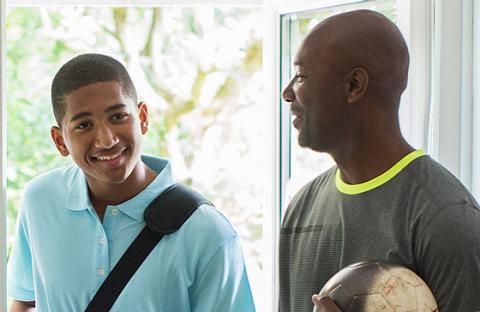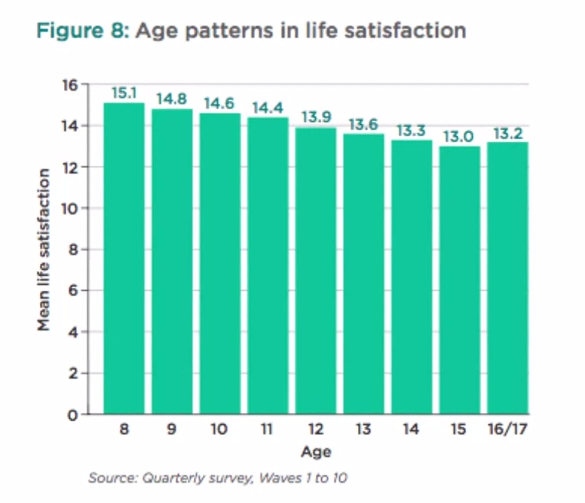|
Adolescence is a transitional period between childhood and adulthood and is a crucial developmental stage for our mental well-being. It is a period of physical, cognitive, social and emotional changes and it is important that adults supporting young people have a good grasp of the challenges they face. Physical changes in adolescence In 2013 The Good Childhood Report (The Childrens Society) charted the life satisfaction of a group of 8 to 17 year olds. They found that during this period life satisfaction declines. When it’s broken down the biggest drop seems to come from anxieties associated with physical appearance. Perhaps this isn't surprising considering that during puberty bodies’ change both in size and shape. Researchers have been debating a lot about whether and to what extent this may impact upon the body image and self-esteem of young people. While physical changes can be awkward for anyone, research suggests that adolescents who perceive their physical development as particularly early or late compared to their peers find it particularly difficult to adjust.
Brain development in adolescence While physical development can be quite obvious many parents and professionals are less aware that adolescence marks a period of profound cognitive development; a period of massive brain growth not seen since infancy. Recently research has been considering whether this can account for some of the common behaviours we see in teenagers: impulsivity, risk taking behaviours and intense emotions. Research has shown that it may have something to do with the pre-frontal cortex. In adults it is the part of the brain that helps us to maintain goal-directed behaviour, moderate intense emotional experiences and check our risky impulsive behaviour. Indeed, there is a great deal of evidence to indicate that purposive action selection depends critically on this particular region of the brain; however, it is also one of the last to develop. It is possible, therefore, that the risky and moody behaviour typically characteristic of this age group could have something to do with the late development of the pre-frontal cortex. Interpersonal relationships in adolescence Interpersonal development is a key stage in adolescence. It is a period of identify formation when young people become more oriented towards their peers, they individuate and separate, and become more autonomous from their family. Identity development correlates significantly with the quality of peer relationships, with their primary caregivers, and with any younger people who are around them. Interpersonal development is crucial in adolescence, and a lot of the psychological resilience and vulnerability manifest here. Transition points between primary and secondary school, residential moves or any other circumstance that forces the adolescent to re-establish themselves within a new peer group are absolutely key. A lot of their personal identity development is who they are to others, and often the most important people to a young person are their peers and who they are to other young people around them. We can also see a high level of compartmentalization in adolescent social circles. That is to say, adolescents can often be somebody completely different to their families, to who they are to friends, to who they are at extra-curricular activities. That is one of the reasons why the quality of a young persons relationships and their social environment is so important and why experiences, such as bullying or social isolation, can have such a profound impact on a young person's mental health and well-being. One of the things that comes with emerging independence, and with individuating as a young person, is the formation of different bonds and different types of relationships. Indeed, the emergence of romantic relationships, and active and romantic feelings, are crucial. This is why it is important that young people have positive and healthy experiences. They are very vulnerable to exploitation and negative experiences which, again, can have a profound effect on their mental health and well-being. Young people tend to experiment a lot with intimate relationships, with romantic relationships, and different types of peer relationships. Sometimes it can be difficult for young people, when identities aren't fully formed and they are less clear about who they are to others, to know how to define these – are they a boyfriend/girlfriend, friend, sporting team mate? These difficulties and uncertainties can make them increasingly vulnerable in relationships where there is a disparity of power. Traditionally adolescence has been discussed and defined as a period of storm and stress. We expect high levels of conflict experimentation; a lot of adolescent identity development is in opposition to what is expected of them. Adolescents can be inter-personally challenging and difficult both within their families, within institutions, and any other contexts that they may find themselves in. They usually struggle with ideas of identity, conformity, and indifference. It is intensely difficult for young people to appreciate how they're perceived by others yet, at the same time, it's also very important to them. Adolescent development waxes and wanes, they can go from moratorium and uncertainty to premature identity formations. It is, therefore, important for parents, carers and professionals to consider these dynamic stages, as premature pinning of expectations can be quite detrimental.
0 Comments
I've just read this article on the Guardian website. The author puts into words what I have been feeling for a while now. The general public just doesn't seems to get what it is we do! The media doesn't help matters of course. I feel proud to be a professional Social Worker. I earned the title academically with an undergraduate degree, post-graduate degree, post qualifying awards and professional development courses. I also earned respect in the field, amongst professionals and in the courts with my direct-work, assessments and analysis. I also know that there are many families and children out there that would say I had a positive impact in their lives too. I feel that the profession is a professional one with status equal to teachers, solicitors, psychologists, etc. The assessments expected of us by the courts are complex and comprehensive. We need a good grasp of sociology, psychology, and politics. Yet most, without any direct experience of Social Work, believe it's nothing more than a chat over a cup of tea. Don't get me wrong, I've managed to produce some good assessments and direct work over a cup of tea. It's just that there is a whole lot more skill to it than that. Perhaps we should promote our profession more and toot our own horns a little bit. However, at the end of the day, does it really matter? It's the results that attest to our value as a profession. It's about the children that are saved and the families that are supported.
|
AuthorI'm a Qualified Children's Social Worker with a passion for safeguarding and family support in the UK. Archives
August 2016
Categories
All
|




